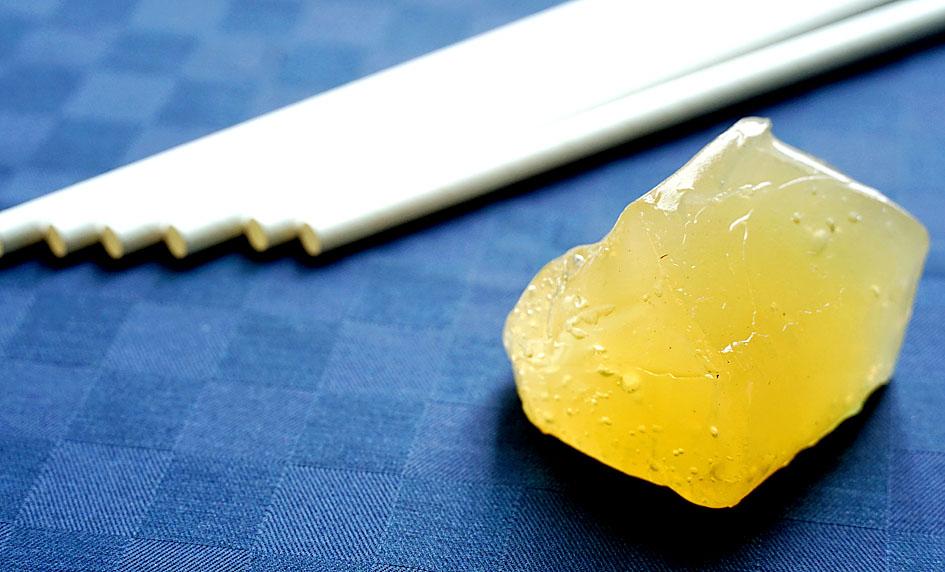The Industrial Technology Research Institute (ITRI, 工業技術研究院) yesterday said it has developed a new environmentally friendly hot-melt adhesive in conjunction with Tex Year Industries Inc (德淵企業).
The new biodegradable adhesive could be a vital component of future biodegradable plastic products, helping to reduce the environmental impact of plastics, the institute said.
The biodegradable adhesive, which has already received its product license, is planned to be turned into a commercial product by Tex Year, the largest maker of hot-melt adhesives in Taiwan, the institute said.

Photo courtesy of Industrial Technology Research Institute
The product should help Taiwanese plastic products go green, as required by an increasing number of large international companies, it added.
The institute’s polymer division and Tex Year began working together last year on the hot-melt adhesive using biodegradable plastic as the base ingredient rather than traditional petrochemical plastic.
The institute said the technical knowledge would be transferred to Tex Year for commercial utilization. The polymer division plans to work on other projects such as decomposing ocean plastic debris and creating other advancements in plastics, it added.
“The ITRI is actively helping Taiwanese industry develop a green supply chain and aid in Taiwan’s green industrial transformation,” said Lee Tzong-ming (李宗銘), deputy director-general of the Material and Chemical Research Laboratories at the ITRI.
In addition to being bio-degradable, the new glue’s special molecular structure design gives it excellent qualities as a hot-melt adhesive, Lee said. It melts at the 80°C, and “has excellent adhesive and durable properties,” he said.
Tex Year chairman Donald Hsiao (蕭向志) said the new adhesive can help clients who need to conform to new EU carbon tax regulations.
“We are the first company in Asia to receive certification from the German Institute for Standardization, and will soon receive our biodegradable and compostable certifications,” Hsiao said.

TAKING STOCK: A Taiwanese cookware firm in Vietnam urged customers to assess inventory or place orders early so shipments can reach the US while tariffs are paused Taiwanese businesses in Vietnam are exploring alternatives after the White House imposed a 46 percent import duty on Vietnamese goods, following US President Donald Trump’s announcement of “reciprocal” tariffs on the US’ trading partners. Lo Shih-liang (羅世良), chairman of Brico Industry Co (裕茂工業), a Taiwanese company that manufactures cast iron cookware and stove components in Vietnam, said that more than 40 percent of his business was tied to the US market, describing the constant US policy shifts as an emotional roller coaster. “I work during the day and stay up all night watching the news. I’ve been following US news until 3am

UNCERTAINTY: Innolux activated a stringent supply chain management mechanism, as it did during the COVID-19 pandemic, to ensure optimal inventory levels for customers Flat-panel display makers AUO Corp (友達) and Innolux Corp (群創) yesterday said that about 12 to 20 percent of their display business is at risk of potential US tariffs and that they would relocate production or shipment destinations to mitigate the levies’ effects. US tariffs would have a direct impact of US$200 million on AUO’s revenue, company chairman Paul Peng (彭雙浪) told reporters on the sidelines of the Touch Taiwan trade show in Taipei yesterday. That would make up about 12 percent of the company’s overall revenue. To cope with the tariff uncertainty, AUO plans to allocate its production to manufacturing facilities in

Six years ago, LVMH’s billionaire CEO Bernard Arnault and US President Donald Trump cut the blue ribbon on a factory in rural Texas that would make designer handbags for Louis Vuitton, one of the world’s best-known luxury brands. However, since the high-profile opening, the factory has faced a host of problems limiting production, 11 former Louis Vuitton employees said. The site has consistently ranked among the worst-performing for Louis Vuitton globally, “significantly” underperforming other facilities, said three former Louis Vuitton workers and a senior industry source, who cited internal rankings shared with staff. The plant’s problems — which have not

COLLABORATION: Given Taiwan’s key position in global supply chains, the US firm is discussing strategies with local partners and clients to deal with global uncertainties Advanced Micro Devices Inc (AMD) yesterday said it is meeting with local ecosystem partners, including Taiwan Semiconductor Manufacturing Co (TSMC, 台積電), to discuss strategies, including long-term manufacturing, to navigate uncertainties such as US tariffs, as Taiwan occupies an important position in global supply chains. AMD chief executive officer Lisa Su (蘇姿丰) told reporters that Taiwan is an important part of the chip designer’s ecosystem and she is discussing with partners and customers in Taiwan to forge strong collaborations on different areas during this critical period. AMD has just become the first artificial-intelligence (AI) server chip customer of TSMC to utilize its advanced